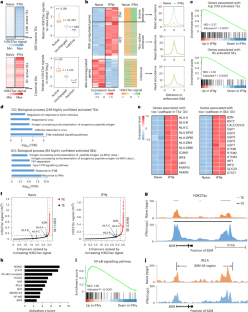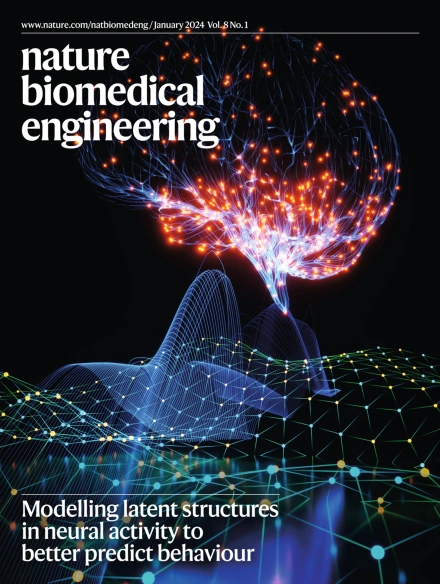Downregulating human leucocyte antigens on mesenchymal stromal cells by epigenetically repressing a β2-microglobulin super-enhancer
IF 26.8
1区 医学
Q1 ENGINEERING, BIOMEDICAL
引用次数: 0
Abstract
Immune rejection caused by mismatches in human leucocyte antigens (HLAs) remains a major obstacle to the success of allogeneic cell therapies. Current strategies for the generation of ‘universal’ immune-compatible cells, particularly the editing of HLA class I (HLA-I) genes or the modulation of proteins that inhibit natural killer cells, often result in genomic instability or cellular cytotoxicity. Here we show that a β2-microglobulin super-enhancer (B2M-SE) that is responsive to interferon-γ is a critical regulator of the expression of HLA-I on mesenchymal stromal cells (MSCs). Targeted epigenetic repression of B2M-SE in MSCs reduced the surface expression of HLA-I below the threshold required to activate allogenic T cells while maintaining levels sufficient to evade cytotoxicity mediated by natural killer cells. In a humanized mouse model, the epigenetically edited MSCs demonstrated improved survival by evading the immune system, allowing them to exert enhanced therapeutic effects on LPS-induced acute lung injury. Targeted epigenetic repression of B2M-SE may facilitate the development of off-the-shelf cell sources for allogeneic cell therapy. The targeted epigenetic repression of a β2-microglobulin super-enhancer downregulates the expression of human leucocyte antigens on mesenchymal stromal cells, making the cells suitable for allogeneic cell therapy.


通过表观遗传抑制β2-微球蛋白超级增强子来下调间充质基质细胞上的人类白细胞抗原
人类白细胞抗原(HLA)不匹配引起的免疫排斥仍是异体细胞疗法取得成功的主要障碍。目前生成 "通用 "免疫相容细胞的策略,特别是编辑 HLA I 类(HLA-I)基因或调节抑制自然杀伤细胞的蛋白质,往往会导致基因组不稳定或细胞毒性。在这里,我们发现对干扰素-γ有反应的β2-微球蛋白超级增强子(B2M-SE)是间充质基质细胞(MSCs)上HLA-I表达的关键调节因子。间充质干细胞中 B2M-SE 的靶向表观遗传抑制可将 HLA-I 的表面表达降低到激活异源 T 细胞所需的阈值以下,同时保持足够的水平以规避自然杀伤细胞介导的细胞毒性。在人源化小鼠模型中,经过表观遗传学编辑的间充质干细胞通过逃避免疫系统而提高了存活率,从而使它们对 LPS 诱导的急性肺损伤发挥了更强的治疗效果。对B2M-SE进行靶向表观遗传学抑制可能有助于开发用于异体细胞治疗的现成细胞来源。
本文章由计算机程序翻译,如有差异,请以英文原文为准。
求助全文
约1分钟内获得全文
求助全文
来源期刊

Nature Biomedical Engineering
Medicine-Medicine (miscellaneous)
CiteScore
45.30
自引率
1.10%
发文量
138
期刊介绍:
Nature Biomedical Engineering is an online-only monthly journal that was launched in January 2017. It aims to publish original research, reviews, and commentary focusing on applied biomedicine and health technology. The journal targets a diverse audience, including life scientists who are involved in developing experimental or computational systems and methods to enhance our understanding of human physiology. It also covers biomedical researchers and engineers who are engaged in designing or optimizing therapies, assays, devices, or procedures for diagnosing or treating diseases. Additionally, clinicians, who make use of research outputs to evaluate patient health or administer therapy in various clinical settings and healthcare contexts, are also part of the target audience.
 求助内容:
求助内容: 应助结果提醒方式:
应助结果提醒方式:


